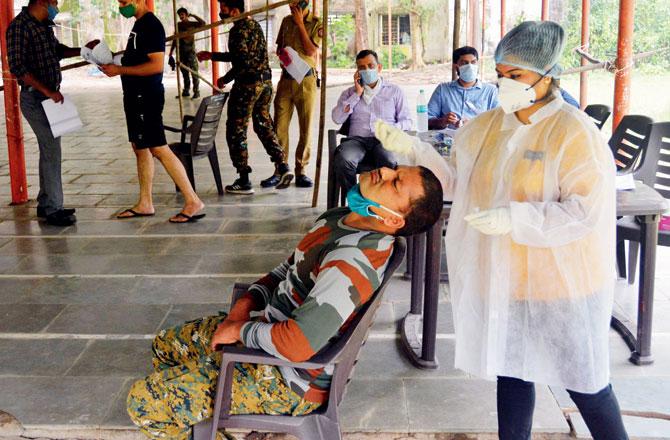City medics are concerned by growing trend of patients requiring hospitalisation with neurological symptoms, abdominal pain or cardiac complication

A civic medical staffer conducts an antigen test at the F south ward office. Pic/Ashish Raje
The COVID-19 graph has started to slant downwards, but health experts are now concerned about a new trend. Patients are being rushed to emergency rooms without any prior COVID symptoms like cough, cold, breathing or respiratory tract issues, etc. In the past few weeks, many patients have been brought into hospitals with either neurological issues (sudden convulsions), or severe abdominal pain, or sudden cardiac complications.
ADVERTISEMENT
During the course of clinical evaluations and RT-PCR tests, it was confirmed that these patients were COVID positive, and going through a silent impact of the disease.

A health worker conducts an antigen test on police personnel (a railway commando) at Ghatkopar East. Pic/Sayyed Sameer Abedi
Dr Ketan Vagholkar, professor of Surgery at DY Patil Medical College, said, "It is reassuring to see a significant dip in the number of fresh COVID cases. However, the cases which are now coming to the emergency rooms, are atypical and don't show the classical symptoms of COVID-19 which were seen in the initial stage of the pandemic. Physicians are now forced to look outside the box and identify atypical presentation of the COVID-19 infection. The infection affects a variety of organ systems besides the lungs. This leads to more confusion in early diagnosis."
Dr Vagholkar added, "Thrombotic complications top the list of atypical presentation. In the past six weeks, I have evaluated six cases of atypical presentation. Two of them had deep vein thrombosis of the lower extremities in young individuals (age group 35 to 40 years), three patients had sudden onset of pain, and distension of the abdomen suggestive of mesenteric thrombosis (blockage of blood supply to the intestine), and the remaining patients had convulsions and stroke. Interestingly, none of these patients had a history of fever or the other clinical symptoms of COVID-19. Therefore, physicians need to consider any symptom suggestive of a thrombotic complication, to be a manifestation of the COVID-19 infection, unless proved otherwise." It was also surprising, that none of the six patients or their relatives were symptomatic and therefore the family could not connect the health issues to it.

A BMC health worker conducts antigen tests at Naigaon, Dadar. Pic/Ashish Raje
A warning for people
Dr Vagholkar has a word of caution to people, "Any symptom of headache, stroke, chest discomfort, abdominal discomfort or sudden swelling of the leg, needs prompt physician evaluation for diagnosis, as well as for COVID testing in order to prevent long-term disability and even mortality."
Dr Wiqar Shaikh, senior allergy and asthma specialist, echoed similar concerns and said, "Initially, COVID-19 was believed to be a respiratory ailment. However, as the months passed, it became clear that it can affect other organs such as the heart, brain, blood vessels, abdomen etc., and indeed can launch a full-body attack."

Dr Ketan Vagholkar, DY Patil Medical College
'Atypical symptoms on the rise'
Dr Ajay Chaughule, a senior cardio-thoracic surgeon said, "Since the beginning of the pandemic, I have been seeing isolated cases of atypical symptoms. However, in the recent past, the number and presentations of such atypical symptoms of COVID-19 patients are on the rise."
Dr Chaughule, recalled the case of a 36-year-old patient who had myocardial infarction and hemiparesis, without COVID history. "After angiography, it was found that he had normal coronary arteries and brain vessels. But he is left with reduced heart functioning and hemiparesis and this is because of COVID-19, a trend which has even put the health experts in a tizzy."

Dr Ajay Chaughule, senior cardio-thoracic surgeon
Dr Chaughule advised, "Any atypical symptom should be treated as that of COVID-19 in the pandemic, unless proved otherwise."
How COVID-19 impacts the human body
According to Dr Shaikh, COVID-19 can impact human organs in different ways, as per studies done by The Journal of the American Medical Association:
The brain: More than 36% of COVID-19 patients experienced neurological symptoms such as headache, dizziness, confusion, etc. Strokes (paralytic attacks) have also been reported and the difficulty here is to distinguish stroke due to COVID-19 and due to a co-morbid condition, such as blood pressure, diabetes, etc.
Heart: Approximately 20% of patients with COVID-19 developed heart complications.
Gastro issues: Studies from both the USA and China have revealed that roughly half of COVID-19 patients experience diarrhea, nausea, vomiting and loss of appetite. In fact, gastrointestinal symptoms could be a warning sign of the COVID-19 infection.
Blood clots : As many as 30% of COVID patients develop blood clots
Loss of taste and/ smell: Approximately 65% of COVID-19 patients report loss of taste and / or smell as per a study published in Nature Medicine.
Skin rashes: A rather unusual presentation of COVID-19 is red and purple coloured toes and swelling, burning and itches. Urticarial rashes are also seen. However, these disappear in almost all patients, and are not a long-term feature.
Hallucinations: Patients who have never suffered from any mental issues have experienced mild to severe hallucinations.
Hearing loss
COVID-19 could lead to tinnitus (ringing in the ears) and hearing loss. It could remain as a long-term complication.
Keep scrolling to read more news
Catch up on all the latest Mumbai news, crime news, current affairs, and a complete guide from food to things to do and events across Mumbai. Also download the new mid-day Android and iOS apps to get latest updates.
Mid-Day is now on Telegram. Click here to join our channel (@middayinfomedialtd) and stay updated with the latest news
 Subscribe today by clicking the link and stay updated with the latest news!" Click here!
Subscribe today by clicking the link and stay updated with the latest news!" Click here!







